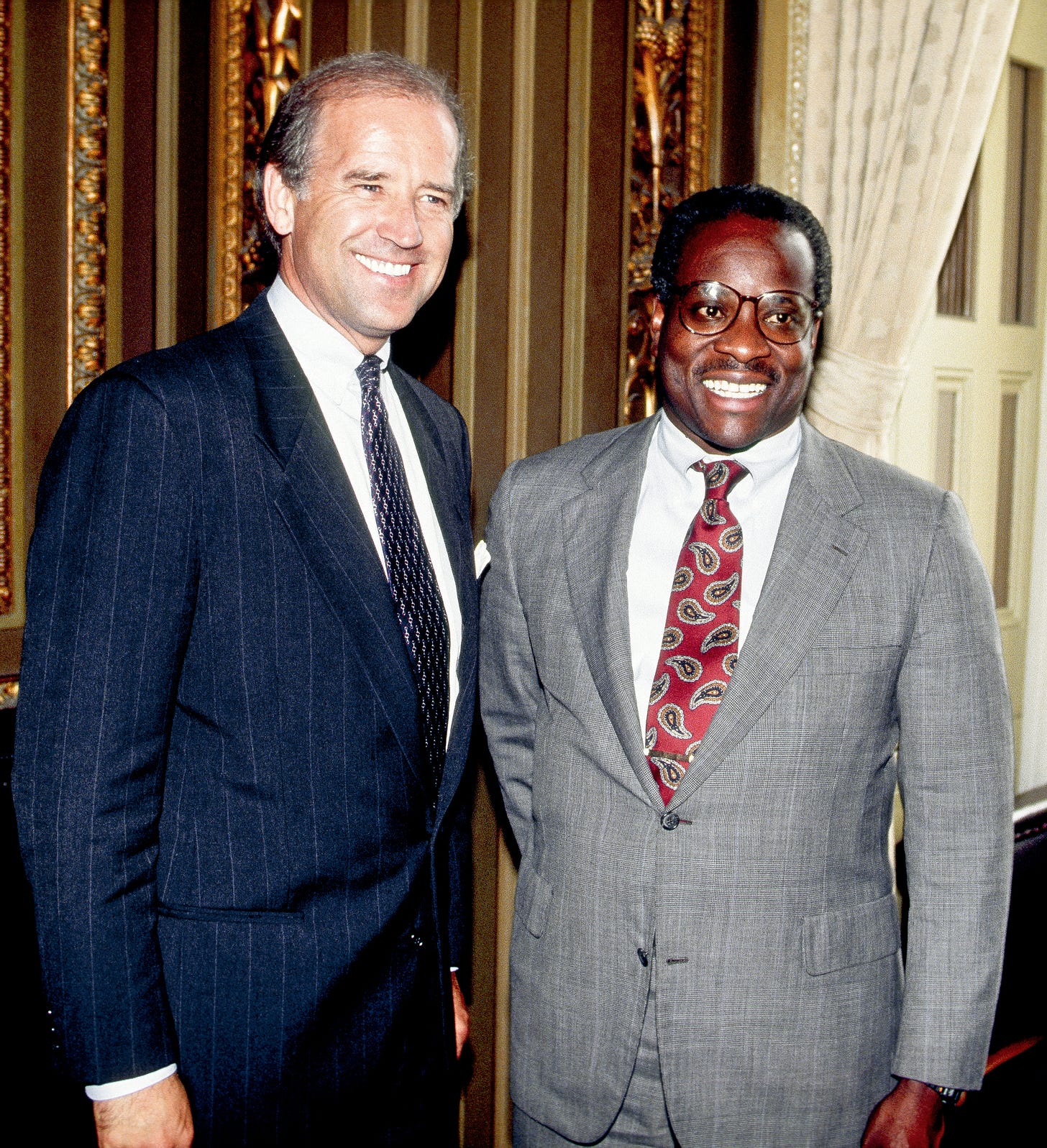The Ascendant Thomas Court – Part 1
How Will the Emboldened Clarence Thomas Shape the US Supreme Court?
Welcome to the Civic Way journal, a quick take on the relevance of breaking news to America’s future governance. The author, Bob Melville, is the founder of Civic Way, a nonprofit dedicated to good government, and a management consultant with over 45 years of experience improving public agencies.
It is better to keep your mouth closed and let people think you are a fool than to open it and remove all doubt. – Mark Twain
Clarence Thomas is the US Supreme Court’s longest-tenured member, having served as an associate justice since his confirmation to the Court in 1991. After over three decades on the Court, he is coming into his own, leading an ascendent right-wing majority to their promised land.
It was long ago, but Thomas’ confirmation process was contentious and, for him, embittering. Still, after much debate, the Democratic-controlled Senate voted to confirm Thomas as a Supreme Court associate justice by a 52–48 vote (41 Republicans and 11 Democrats).
Justice Thomas’ judicial philosophy is, if nothing else, ideological.
During his confirmation hearings, he praised stare decisis (i.e., adherence to precedent), calling it a “critical concept.” He has claimed to be an originalist, at least when it serves his ideological ends. However, in practice, Thomas has defied precedent more than any other justice. Last year, Thomas said, "We use stare decisis as a mantra when we don't want to think.” As former Justice Scalia said more than once, Thomas is no originalist.
Thomas has expressed a desire to overrule prior Supreme Court decisions about 250 times. He has suggested revisiting several cases that bequeathed us enduring legal principles (e.g., Gideon v. Wainwright, New York Times v. Sullivan and Obergefell v. Hodges). In the coming years, he is likely to advocate new law to attain ideological goals on such issues as guns, elections, regulation and privacy).
Until recently, Thomas has shielded his persona from the outside world. Among those working at the Court, Thomas appears well-liked. He is known there for his outgoing nature, hearty sense of humor and innate ability to connect on a personal basis with individual Court employees.
To Court observers, Justice Thomas has long enjoyed a reputation as the quiet justice. Before 2006, he sat silently during nearly 99 percent of the Court’s oral arguments. After 2006, he participated in nearly 700 consecutive cases without asking a question, a Court record. Thomas finds the frequent oral argument interruptions by other justices disruptive and ineffective, once saying, “we look like Family Feud.”
It wasn’t until 2020, when the Supreme Court began holding teleconferenced oral arguments (due to the pandemic), that Thomas started making his presence known. Now, at age 72, Thomas seems almost eager to share his persona with the public and perhaps push the Court in a new direction.
As the senior member of the Court’s rising right-wing majority, Thomas seems to relish his new pulpit. Will this drive a wedge between him and Chief Justice Roberts? Thomas recently implied that the Court’s atmosphere was more collegial before Roberts’ 2005 confirmation, "We may have been a dysfunctional family, but we were a family..." After touting his working relationships with former colleagues Ruth Bader Ginsberg and Sandra Day O'Connor, he lamented, “This is not the court of that era."
Thomas recently used his pulpit to express angst about the Court’s credibility. At a recent Eleventh Circuit judicial conference, referring to the leak of Justice Alito’s draft anti-abortion opinion, Thomas spoke of the Court’s vulnerability if citizens are unwilling to “live with outcomes” they don’t like. He warned, "I wonder how long we’re going to have these institutions at the rate we’re undermining them … and when they’re gone or destabilized, what we’re going to have as a country.”
Setting aside the irony of his wife’s efforts to overturn the 2020 election, and the added irony that the January 6th Capitol Coup took place one block from his office, we should be able to agree that Thomas’ fears about the Court’s public credibility are well-founded.
The Court’s stature as an impartial, independent branch of government is fading. While Americans continue to place more trust in the federal judicial branch than the executive and legislative branches (low bar), their trust in the judicial branch (including the Supreme Court) fell to 54 percent in 2021 (down from 67 percent the prior year, according to Gallup).
Why is this happening? Surely not because of the recent leak. The Court’s public trust has been declining for years. And not because people think this Court is more ideological than prior courts, like the Warren Court. The public understands (or simply doesn’t care) that the Supreme Court is an inherently political (and thereby ideological) institution.
In my next essay, I will discuss some likely causes for the Court’s fading reputation and how Justice Thomas could develop and invoke a potential Thomas Rule to help reverse that trend.




